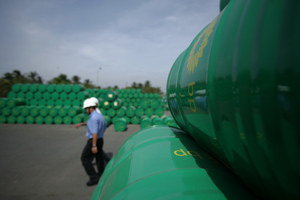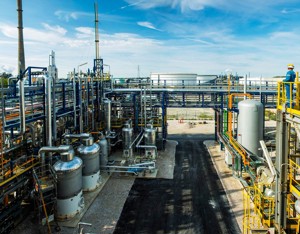The Downstream Rundown: 5/20
The downstream rundown: In case you missed it 5/20
In case you missed any downstream news, this piece will give you a summary of some of the top stories from last week.
Chevron says world's largest carbon capture project has 'a ways to go' to meet goals
Chevron Corp's Gorgon carbon capture and storage (CCS) project in Australia is working at only half its capacity nearly three years after starting up and the company has no timeframe for delivering on targets it has so far failed to meet, a senior executive said.
The world's largest CCS project, which started up three years late, is being closely watched by the gas industry globally as carbon capture and storage is seen as essential for producers to meet net zero emissions targets by 2050.
Aspentech completes Emerson transaction, expanding high-performance global industrial software leadership
AspenTech announced the completion of its transaction with Emerson Electric, including the addition of Emerson’s OSI Inc. and Geological Simulation Software (GSS) businesses to AspenTech. As part of the close of the transaction, Emerson has contributed $6.0 B in cash to AspenTech, which will be received by AspenTech shareholders, in exchange for a 55% stake in AspenTech. In addition, Emerson and AspenTech have entered into an enhanced commercial partnership that will enable AspenTech to penetrate new and existing markets. The Company now employs more than 3,700 people located in 62 offices across 41 countries.
AspenTech offers customers a highly differentiated industrial software portfolio with the capabilities to optimize the entire asset lifecycle across a wide range of industry verticals. With this new set of solutions, AspenTech is now increasingly well positioned to help customers solve for the complexity of the dual challenge: meeting the increasing demand for resources from a rapidly growing population in a profitable and sustainable manner.
Neste introduces co-processed marine fuel in partnership with Nordic Marine Oil
Together with its partner Nordic Marine Oil, Neste is piloting a new Neste Marine 0.1 co-processed marine fuel in Scandinavia – a solution helping the maritime sector to reduce the GHG emissions. The ISCC PLUS certified marine fuel enables up to 80% GHG emission reduction over the lifecycle compared to fossil fuels without compromising the product quality and performance.
Accounting for 90% of world trade and 13% of global transport emissions, the shipping industry needs solutions to reduce its carbon footprint in a viable way in line with the targets of the International Maritime Organization.
bp and Linde plan major CCS project to advance decarbonization efforts across Texas Gulf Coast
bp and Linde announced plans to advance a major carbon capture and storage (CCS) project in Texas that will enable low carbon hydrogen production at Linde’s existing facilities. The development will also support the storage of CO2 captured from other industrial facilities – paving the way for large-scale decarbonization of the Texas Gulf Coast industrial corridor.
Upon completion, the project will capture and store CO2 from Linde’s hydrogen production facilities in the greater Houston area – and potentially from its other Texas facilities – to produce low carbon hydrogen for the region. The low carbon hydrogen will be sold to customers along Linde’s hydrogen pipeline network under long-term contracts to enable production of low carbon chemicals and fuels.
Worley to support Avantium in the next project phase of its flagship bioplastics facility
Worley advances to provide EPC services to Avantium for their first-of-a-kind bioplastics facility in Delfzijl, the Netherlands.
This follows on from the work previously completed by Worley on the concept development and front-end engineering design of the facility.
Avantium’s bioplastics facility will produce plant-based furandicarboxylic acid (FDCA), a key building block for many chemicals and plastics, such as polyethylene furanoate (PEF), a fully recyclable plastic. It will be the world’s first facility to produce FDCA on a commercial scale, with a capacity of five kilotons per year. This project will be the commercial proof for future larger-scale developments.
Majority of Phillips 66 shareholders support studying shift away from virgin and single-use plastics
A first-of-its-kind shareholder resolution challenging a major petrochemical company on plastics production received majority support (50.4%) from Phillips 66 shareholders at the company’s annual meeting last week.
The resolution requests that Phillips 66 publish a report describing how it could shift its plastic production business from virgin to recycled plastic polymers, assess the resilience of its petrochemical assets under virgin-to-recycled transition scenarios of five and 10 years, and study the financial risks associated with such scenarios.
Chevron launches carbon capture and storage project in San Joaquin Valley
Chevron aims to reduce its carbon intensity - the amount of CO2 emitted per unit of energy produced - by installing CO2 post-combustion capture equipment, capturing the CO2 and then safely storing it thousands of feet underground. This CCS initiative would begin at Chevron’s Kern River Eastridge cogeneration plant in Kern County, California.
“At Chevron, we believe the future of energy is lower carbon. Reducing the carbon intensity of the energy people rely on day-in and day-out is well-aligned with the ambitions of the Paris Agreement,” said Chris Powers, vice president of Carbon Capture, Utilization, and Storage (CCUS) for Chevron New Energies. “We are excited about the opportunity to collaborate and progress this CCS initiative in San Joaquin Valley, a region where we have lived and worked for over a century.”
Pertamina, Air Liquide to study carbon capture
Indonesia's state energy company PT Pertamina said late on Tuesday it will jointly study carbon capture technology at its refinery in Balikpapan with a local unit of French gas company Air Liquide.
Pertamina and Air Liquide Indonesia, signed a joint study agreement on capturing carbon emissions from its Balikpapan hydrogen production facility and storing the carbon in the Kutai basin area off East Kalimantan province.
Some of the emissions would be converted into products like methanol, which can be used to produce low-carbon fuels, Pertamina said in the statement.
TotalEnergies and New Hope Energy partner on U.S. advanced recycling project
TotalEnergies and New Hope Energy today announced a commercial agreement under which New Hope Energy will build an advanced recycling plant in Texas to transform end-of-life plastic waste into a recycled feedstock that TotalEnergies will partly purchase and convert into virgin-quality polymers, which can be used for food-grade packaging.
The New Hope Energy plant is expected to start production in 2025 and will use a patented pyrolysis technology that was developed in partnership with Lummus Technology to process and convert more than 310,000 tons per year of mixed plastic waste that would otherwise be destined for landfill or incineration. TotalEnergies will use 100,000 tons of Recycled Polymer Feedstock (RPF) in its Texas-based production units to manufacture high-quality polymers suitable for food-grade applications such as flexible and rigid food packaging containers.
Encina Achieves ISCC PLUS Certification
Encina Development Group announced today that it achieved the International Sustainability and Carbon Certification (ISCC) PLUS designation for its circular monomers converted from post-consumer and scrap plastic.
ISCC is a leading, internationally recognized third-party certification system. By achieving the voluntary designation, companies and their customers know that the sustainability characteristics that are being claimed, such as percentage of recycled content, have been credibly validated. It applies to the entire supply chain and many kinds of bio-based feedstocks and renewables, and relies on a framework with verifiable bookkeeping and predefined transparency requirements.









Comments